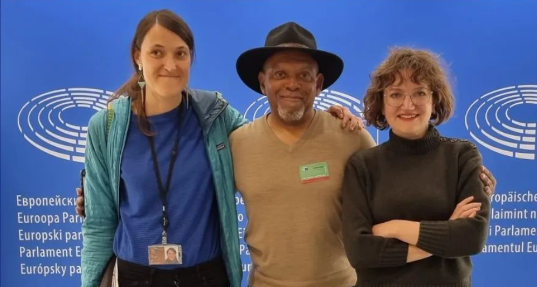This is What Environmental Racism Looks Like.
Since the Russian invasion of Ukraine, U.S. political leaders have pledged to massively increase the fracked US gas exports to Europe. These moves will have grave implications for communities that are forced to live near the massive polluting facilities that liquify and ship fossil fuels across the Atlantic.
But these frontline communities are ready to defend the health and safety of their communities. And one of the leaders in this fight traveled to the EU to spread the word.
John Beard, frontline community leader and leader of the Port Arthur Community Action Network in Port Arthur, Texas met EU decision makers in April, telling them how their decisions on US LNG imports have a real impact on the lives and health of people in the US.
John lives in the “belly of the beast”– a community that has been turned into a sacrifice zone, heavily impacted by the petrochemical industry and large gas export facilities.
While the EU must stop its dependence on Russia, the bloc must not exchange one dangerous dependency with another one, which is harming communities in the US. US gas has been cynically dubbed “Freedom Gas,” but it is clear that many of those impacted by fossil gas export plans are suffering misery including poverty, health impacts and the aggravating impacts of climate change that are disproportionately affecting them.
The “belly of the beast”
John and his community live in the immediate vicinity of petrochemical facilities and next to a massive terminal to export liquefied fossil gas: the gigantic Sabine Pass LNG terminal. In 2022, around 40% of all US LNG vessels to Europe started their journey right there, in Sabine Pass. It’s not rare that John wakes up to see mysterious chemical grains covering the grass, finds himself in the middle of a plume, or fears that fossil gas leaks in his house but discovers that it is a chemical stench originating outside. John never knows which will be the next chemical he finds in his garden or on his car. It is not unusual for him to see massive flares of gas, topped with pitch-black clouds, or eerily yellow clouds containing sulfur dioxide, a chemical corroding our lungs, in his community.
“People of color are hurt the most and helped the least”
“People of color are hurt the most and helped the least,” says John – who knows that in his community, a large majority of the population are people of color. The environmental racism and injustice is visible in almost all the communities heavily impacted by polluting industries in the region, both up and down the coast. Communities with poor, indigenous people and people of color are deemed as the “path of least resistance” by corporate polluters.
Now there are several additional LNG export terminals that are planned just a handful of kilometers away from John’s community, despite all the harm people there are already suffering. Giant polluters like Sempra, Cheniere and ExxonMobile plan to expand the LNG export business, on the back of communities like Port Arthur – all because they claim Europe needs the gas.
The luxury of living and breathing
These are devastating news for a region which, despite over $80 billion of industrial investment, sees a high unemployment rate, inhumanely low wages and plummeting property values. This makes it extremely difficult for many people wanting nothing but the luxury of “living and breathing” and to live a healthier life. Those who have to stay suffer from a multitude of illnesses. Black people in Port Arthur have a 40% higher risk to contract cancer than elsewhere in the country.
Port Arthur is the place where much of Europe’s US LNG comes from . But this is only a fraction of the suffering caused by our gas greed: Many more communities impacted by LNG and fracking and massive fossil infrastructure are forced to sacrifice the right to drink clean water and breathe clean air.
It doesn’t have to be this way. The good news is that truly clean solutions are ready for us. We just need the political will to get started and to be able to meet people like John without that burning feeling of guilt.



